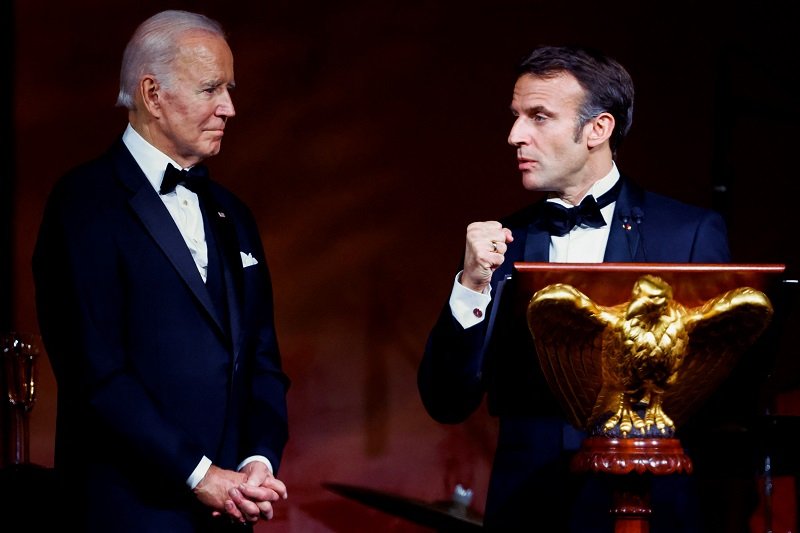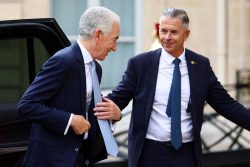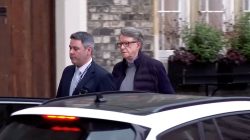
France’s President Emmanuel Macron speaks while U.S. President Joe Biden listens, as the Bidens host the Macrons for a State Dinner at the White House, in Washington, U.S., December 1, 2022.
14:07 JST, December 2, 2022
WASHINGTON/KHERSON, Ukraine (Reuters) – The presidents of the United States and France said they would hold Russia to account for its actions in Ukraine and the European Union reached tentative agreement on an oil price cap to squeeze Moscow’s export earnings.
Western powers are trying to rally support for Ukraine, which is reeling from missile and drone attacks targeting power supply, water and heat in its cities just as winter has set in nine months into Russia’s invasion.
Russia meanwhile accused the United States and NATO of playing a direct and dangerous role in the war and said Washington had turned Kyiv into an existential threat for Moscow which it could not ignore.
In a bid to reduce the money available for Moscow’s war effort, the European Union tentatively agreed on Thursday on a $60 a barrel price cap on Russian seaborne oil, according to diplomats. The measure would need to be approved by all EU governments in a written procedure by Friday.
U.S. President Joe Biden and French President Emmanuel Macron said in a joint statement after Oval Office talks on Thursday that they were committed to holding Russia to account “for widely documented atrocities and war crimes, committed both by its regular armed forces and by its proxies” in Ukraine.
Biden said Washington and Paris “are facing down Vladimir Putin’s grasping ambition for conquest” and “defending the democratic values and universal human rights.”
Biden told reporters he was prepared to speak with the Russian president “if in fact there is an interest in him deciding he’s looking for a way to end the war,” but added that Putin “hasn’t done that yet.”
Macron said he would continue to talk to Putin to “try to prevent escalation and to get some very concrete results” such as the safety of nuclear plants.
UKRAINE’S CASUALTIES
There are no political talks underway to end the war, which Russia began on Feb. 24 as a “special military operation” claiming its aim was to disarm its neighbour and root out leaders it characterises as dangerous nationalists.
Ukraine and the West call it an imperialist land grab, which has killed tens of thousands of Ukrainian civilians and soldiers on both sides.
Ukraine’s armed forces have lost somewhere between 10,000 and 13,000 soldiers so far, presidential adviser Mykhailo Podolyak told a Ukrainian television network on Thursday.
“We will never urge the Ukrainians to make a compromise which will not be acceptable for them, because they are so brave,” Macron said in Washington.
Ukrainian President Volodymyr Zelenskiy, in a video posted on Thursday night, remarked that Dec. 1 was the anniversary of a referendum 31 years ago when Ukraine – then still part of the Soviet Union – voted overwhelmingly in favour of independence.
“Our desire to live freely … will not be broken. Ukrainians will never again be a tiny stone in some empire,” Zelenskiy said.
ATTACKS ON INFRASTRUCTURE
The stakes have increased in recent weeks as Russia intensified a campaign to knock out power, water and heat supplies in Ukrainian cities. Ukraine and the West say the strategy deliberately intends to harm civilians, a war crime.
Kyiv mayor Vitaliy Klitschko on Thursday told residents to stock up on water, food and warm clothes in the event of a total blackout and advised people to consider staying with friends on the outskirts of the capital if they could.
The attacks on infrastructure are likely to increase the cost to keep Ukraine’s economy going next year by up to $1 billion a month, and aid to the country would need to be “front-loaded”, IMF head Kristalina Georgieva told the Reuters NEXT conference on Thursday.
Russian artillery pounded the regional capital of Kherson in southern Ukraine, the General Staff of the Ukrainian Armed Forces said in a statement on Thursday night.
Russian forces, having abandoned the city of Kherson in November, are trying to establish defensive positions and are shelling several towns north of Kherson, the statement said.
Russian Foreign Minister Sergei Lavrov, speaking during an annual news conference in Moscow, defended recent missile strikes, saying it was targeting Ukraine’s civil infrastructure to prevent Kyiv from importing Western arms.
He did not explain how such attacks could achieve that aim.
“We disable energy facilities (in Ukraine) that allow you (the West) to pump lethal weapons into Ukraine to kill Russians,” Lavrov said.
“So don’t say that the U.S. and NATO are not participants in this war – you are directly participating.”
PRISONER SWAP
In a sign some channels of communication remain open, Russia’s Defence Ministry and the head of Ukraine’s presidential administration said the two countries swapped 50 service personnel on Thursday.
After pulling back in the south in November, Russia has focused its firepower on a section of the front line in the east near the city of Bakhmut.
Russian forces shelled about a dozen towns in the area, including Bakhmut and nearby Soledar as well as further north near Sporniy and in Bilohorivka, Thursday night’s Ukrainian military statement said.
Top Articles in News Services
-

Survey Shows False Election Info Perceived as True
-

Hong Kong Ex-Publisher Jimmy Lai’s Sentence Raises International Outcry as China Defends It
-

Japan’s Nikkei Stock Average Touches 58,000 as Yen, Jgbs Rally on Election Fallout (UPDATE 1)
-

Japan’s Nikkei Stock Average Falls as US-Iran Tensions Unsettle Investors (UPDATE 1)
-

Trump Names Former Federal Reserve Governor Warsh as the Next Fed Chair, Replacing Powell
JN ACCESS RANKING
-

Producer Behind Pop Group XG Arrested for Cocaine Possession
-

Japan PM Takaichi’s Cabinet Resigns en Masse
-

Man Infected with Measles Reportedly Dined at Restaurant in Tokyo Station
-

Israeli Ambassador to Japan Speaks about Japan’s Role in the Reconstruction of Gaza
-

Videos Plagiarized, Reposted with False Subtitles Claiming ‘Ryukyu Belongs to China’; Anti-China False Information Also Posted in Japan





















